#databasemanagementsystem
Text


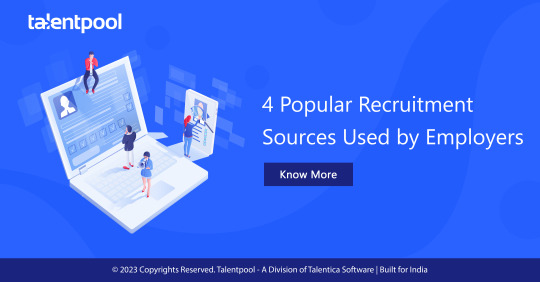
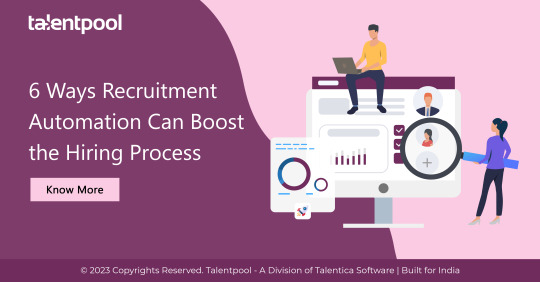

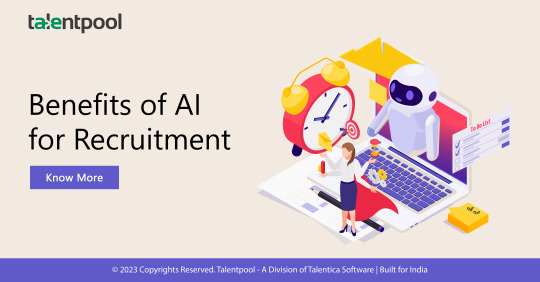
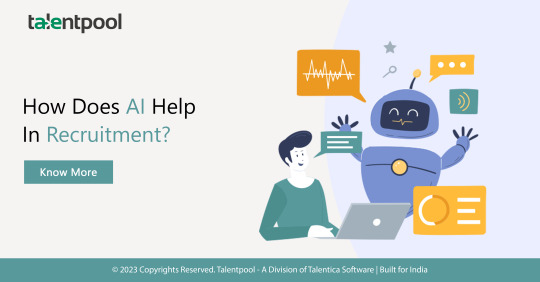
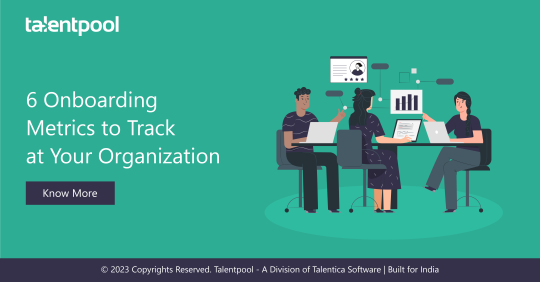

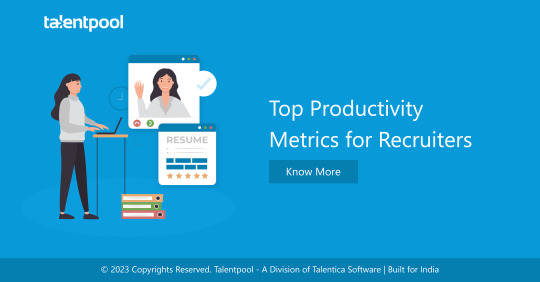
Best Recruitment Software in India | Talentpool
Get the best recruiting software for small and mid-sized companies. Talentpool is designed specifically with features that makes recruitment easy and efficient. Call for Free Demo Today!
#recruitment outsourcing#recruitmentmanagementsoftware#applicanttrackingsystem#databasemanagementsystem#applicanttrackingsoftware#recruitmentsoftware#applicanttrackingsystem recruitmentsoftware#recruiting#recruitment
0 notes
Text
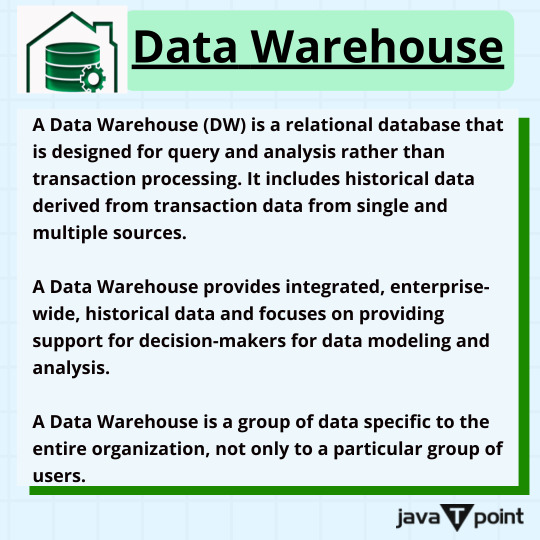
Data Warehouse
.
.
.
for more information
http://bit.ly/3TJPgoe
check the above link
#datawarehouse#dbms#rdbms#data#query#database#databasemanagement#databasemanagementsystem#javatpoint
0 notes
Text
7 Reasons Why Your Business Requires A Database Management System
A database management system (DBMS) is a software application that stores, retrieves, queries, and manages data. Authorized entities can use user interfaces (UIs) to create, read, edit, and delete data. Database management systems are significant because they provide a centralized view of data to programmers, database administrators, and end users, freeing applications and end users from needing to comprehend where data is physically located. APIs (application program interfaces) handle internet requests and responses for specific sorts of data.
Most firms, particularly those in growth, can profit from the use of a database management system (DBMS). In marketing materials, relational and non-relational DBMS components given over the internet may be referred to as DBaaS (database as a service). Database management systems designed to enable distributed data in the cloud currently account for half of the overall DBMS market, according to Gartner.
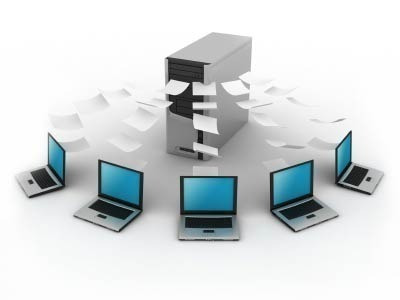
1. Enhanced Metadata Management
Improved metadata management is one of the major benefits of utilizing a DBMS. Do you know what metadata is? Metadata is information about information. It contains information like the table's name, column titles, and data types. Good metadata management is critical for making data easy to find and use. When everything is properly arranged, users may immediately discover the data they require without having to browse through numerous files. A database management system (DBMS) makes it easier to maintain metadata and keep track of changes to data. This is especially critical when data is often changed. You can use a DBMS to ensure that the metadata is always up to date.
2. Enhanced Data Security
A database management system (DBMS) can help increase data security by incorporating measures that make it more difficult for unauthorized people to access the data. The system can also be used for user authentication, data encryption, and control access. Only authorized users can access the data thanks to user authentication. Encryption prevents unauthorized individuals from accessing data. Administrators can use access control to specify which users have access to which data. This data can be used to identify potential security breaches and take corrective action.
3. Increased Efficiency
A well-designed DBMS can also boost your company's performance. A DBMS can help you save time when searching for and retrieving data. You can also utilize the system to rapidly and conveniently conduct complex calculations. This can save your company both time and money. A DBMS can also help you manage your data more effectively. When data is properly structured, it is easier to find and use. This can lead to higher productivity and cost savings.
4. Easier upkeep of large databases
Maintaining huge databases without spending too much time or money is one of the most difficult tasks that businesses confront. A database management system (DBMS) can assist you in overcoming this difficulty by providing an easy way to alter your data. You may also utilize the system to trace any modifications made to the data, making it easy to diagnose issues. It should be noted that not all DBMSs are made equal. You must choose a system that is appropriate for the type of data you are storing. Massive enterprises frequently require a solution that can handle extremely large databases.
5. Effective Querying
A database's principal function is to store and retrieve data quickly and easily. This is accomplished through the use of queries. A well-designed database will contain efficient queries that produce the results you require in a timely manner. A DBMS allows you to design bespoke queries that return the exact information you require. You may also save your queries for later use, making it easier to retrieve the information you require without having to spend a lot of time structuring the query.
6. Better Decision Making
Making rapid and correct judgments is critical for any organization. A DBMS can assist you in this by allowing you to swiftly analyze your data. The system may generate reports and graphs that show how your data changes over time. This data can help you make informed decisions about the path of your company. A DBMS allows you to rapidly find the information you need to make informed decisions. You can also utilize the system to rapidly and conveniently conduct complex calculations. This can save your company both time and money.
7. Enhanced Efficiency
A well-designed database management system can help your organization run more smoothly. When data is properly structured, it is easier to find and use. This can lead to higher productivity and cost savings. A database management system can also help you handle your data more effectively. When data is properly structured, it is easier to find and use. This can lead to higher productivity and cost savings.
As you can see, a DBMS can give various benefits to any firm. So, when it comes to selecting a database management system for your organization, you have a lot of possibilities. Make sure to choose a system that matches your company's specific requirements. A strong database management system will assist you in improving the performance of your organization and making better decisions.
Choose a right Database Management System
Whether your organization wants to develop database management best practices or implement a database management system, selecting the correct DBMS is influenced by a variety of criteria and priorities. Understanding your present database(s) is the first and most important step in selecting which DBMS is best for you. Each database will have its own set of data, so organizations should be aware of their requirements. A good DBMS will provide a consolidated view of the state of your data, allowing you to understand where it is stored and how it is being used. Not to mention, a DBMS will provide access to data across several applications without the need for data replication. It's also crucial to remember that, like many other systems, a DBMS will require additional memory and CPU, so organizations should consider whether they can meet this requirement. However, the advantages of DBMS are palpable, particularly when dealing with large amounts of sensitive data, such as that seen in healthcare institutions.
Conclusion:
Databases are vital for firms that need to store sensitive information. Whether you're storing information for auditing or security, you'll need a place to keep it safe and organized. NodeSol assists businesses in making well-informed strategic decisions. We have been one of the most sought-after 'Database Management Services' suppliers, providing best-in-class services to some of the world's largest corporations across industries. Our professionals have a solid understanding of both open and closed-source databases and can assist you in implementing the best-suited solutions following a full examination of organizational requirements and business goals. Let's talk about your idea and create something spectacular so get in touch with us.
0 notes
Text
PostgreSQL vs MySQL – Which Database is Best For Your Project?

PostgreSQL and MySQL are relational databases that manage data in tables. These tables can be connected or linked based on data that is common to each. Relational databases allow your business to better understand the relationships among available data and help achieve new insights for making better decisions or recognizing new chances. PostgreSQL vs MySQL is important when choosing an open-source relational database management system. Both PostgreSQL and MySQL are time-proven solutions that can compete with business solutions such as Oracle and SQL Server. In this article, we will describe the differences between MySQL and PostgreSQL.
What is SQL?
SQL stands for Structured Query Language. It is used to handle relational databases and perform different operations on their data. The purpose of SQL is to store, recover, handle and operate data within a database management system. SQL was developed by IBM in the early 1970s and became publically in 1979. It is globally acknowledged as the standard relational database management system (RDBMS).
What is MySQL Database?
MySQL is a simple, fast, scalable, and easy-to-use open-source relational database system. It is efficient and user-friendly, making it one of the most recognizable technologies. You can quickly learn many MySQL ideas to create robust data storage systems using SQL. MySQL uses an access system that provides authentication through the hosting provider and an encrypted password system for security.
Full Article Source: https://www.temok.com/blog/postgresql-vs-mysql/
0 notes
Text
Why MySQL Remains The Go-To Database Management System?
Most users will never see the backend technology for most applications and software where a database like MySQL executes its instructions. When a database works, users on the front end can interact with the data stored in the tables and rows. So you are building a software application. One of the first problems to be solved is how to store your data. Which database will you choose?
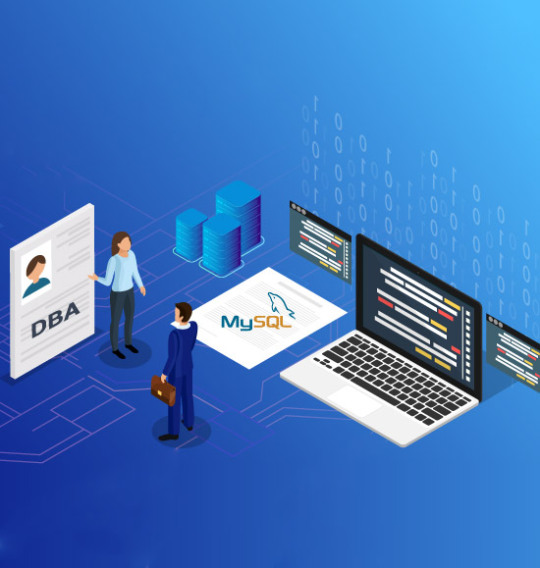
0 notes
Text
Free DBMS notes on our website
https://pywix.blogspot.com/2020/12/ComputerScienceNotes.html
you can also check Complete dbms playlist
https://www.youtube.com/playlist?list=PLYW6Fx00Iub-Aw-3ppt42uCapQ2LoIlcH
#dbms #dbmstutorials #dbmslectures #sqlqueries #computerscience #mysqltutorials #sql #lecturenotes
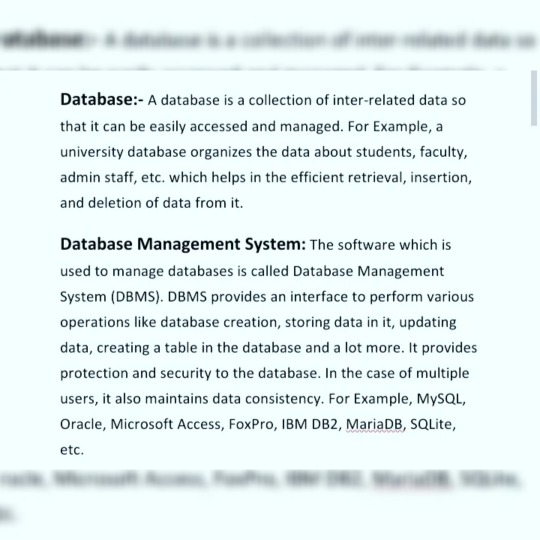
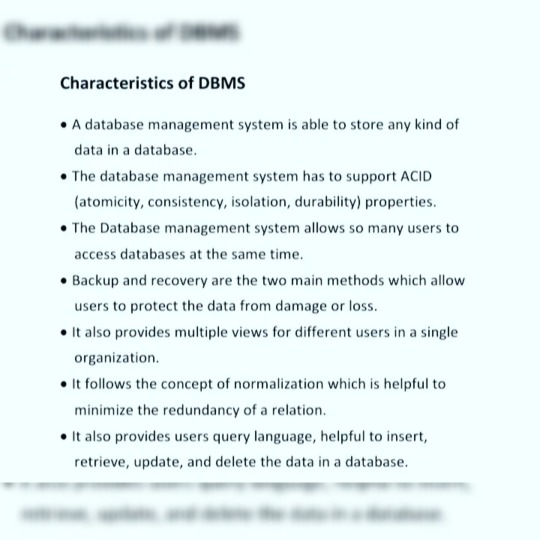
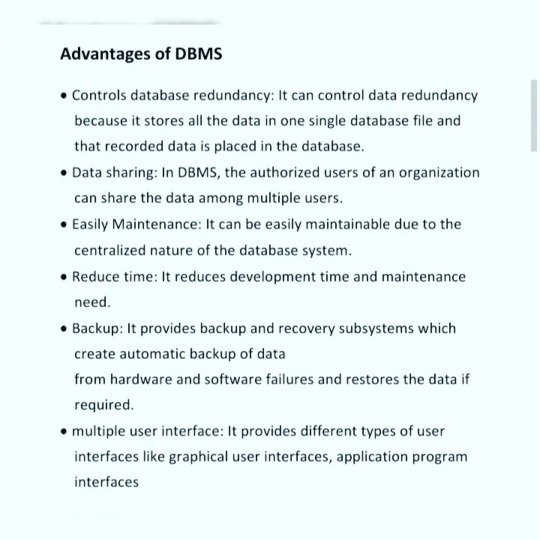
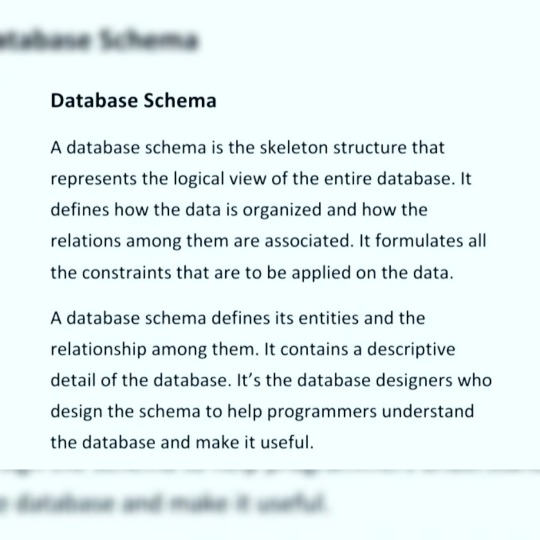
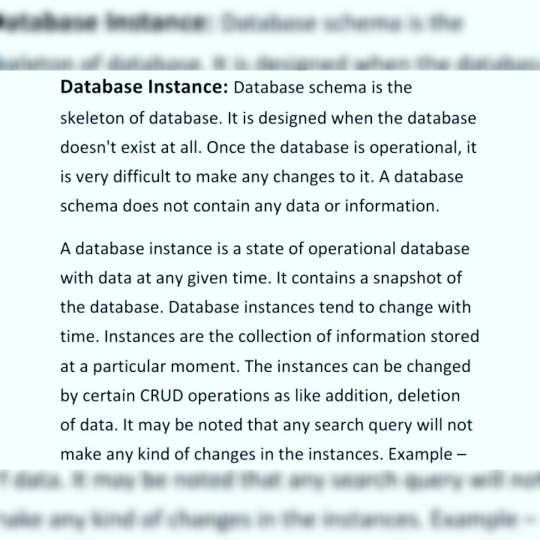
#dbms#database#lecture#tutorial#dbmsnotes#databasemanagementsystem#dbmstutorial#pywixclasses#computerscience#computer technology#computer tips#mysql database#mysql#sqlserver#sql#sqlite#databasenotes
0 notes
Text
Which is the best database management system For Research Business: Ameva Tech
A database management system is a software tool utilized to generate and manage one or more databases, proposing an easy manner to generate a database, update tables, retrieve information, and improve data. A DBMS is where data is retrieved, modified and locked to safeguard the conflicts.
A database management system also delivers the tools to administer the database schema – which commands the structure of the database itself. In several cases, the best database management system will be seen only by the database developer, because the developer will deliver a dissimilar front-end for the customer. This front-end could be considered, by the most technical definition, to be a database management system in its own right — however, it is more probable to go by another name, such as a customer relationship management (CRM) tool.
Amevatech help users with top database management software which share data quickly, effectively, and steadily across an organization. By delivering the quick solutions to database queries, a data management system allows faster admittance to more accurate data. End users, like salespeople, are able to speed up sales cycles and get more precise in their sales panning.

Our database management software solutions convey a better framework for the enforcement of privacy and security policies. By orchestrating data in a combined manner, companies can manage privacy and data security centrally, assisting the unify their systems of record and lower the perils of regulatory violations. Amevatech is an extremely flexible and ascendable solution with a custom dashboard where users are capable to measure and equivalence the performance of ad channels and campaigns as well as track their clients’ conversion paths.
At Amevatech, database management software solutions provide 5 main operations:
Granting several users concurrent admittance to a single database.
Establishing and preserving security rules and user admittance rights.
Backing up data frequently and recovering it speedily should a breach occur.
Setting up database norms and standards to guard the data integrity.
Delivering “dictionary” definitions and descriptions of obtainable data.
Of course, a DBMS does not substitute a database manager or a database administrator. These specialists confirm the database structure runs as it should, and they can generate the user permissions to control who has admittance to the data. Together, a DBMS and a specialist can confirm the quality control over the data.
Furthermore, with a database management system, businesses can eradicate the issues that occur with data inconsistency, which happens if several forms of the same data exist in dissimilar locations. A DBMS delivers the organizations a complete, clear view into the way data is shared, confirming there aren’t unnecessary copies of data. Not to mention, A Top Database Management Software enables the organizations to enforce data security and privacy policies to decrease the perils of a data breach.
Finally, end users will be sanctioned to make informed decisions reliant on the data available. Better, more dependable data means high-quality, practical information that can assist the users make decisions with the exact data they require. Ultimately, this results in advanced the productivity throughout organization.
Related Post:-
Best Web Design and Development Company in India
Feel Free to Contact Us: –
Ameva Tech
+91-9873354227
0 notes
Text
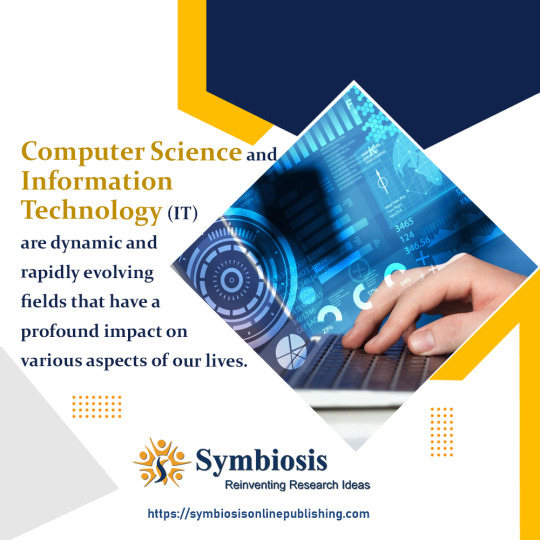
𝐒𝐨𝐟𝐭𝐰𝐚𝐫𝐞 𝐃𝐞𝐯𝐞𝐥𝐨𝐩𝐦𝐞𝐧𝐭: Software development is at the core of computer science. Developers create applications, operating systems, web services, and mobile apps using programming languages and development tools.
𝐃𝐚𝐭𝐚 𝐒𝐜𝐢𝐞𝐧𝐜𝐞 𝐚𝐧𝐝 𝐀𝐧𝐚𝐥𝐲𝐭𝐢𝐜𝐬: Data science involves collecting, processing, and analyzing large datasets to extract valuable insights. It is used in various domains, including business, healthcare, finance, and scientific research.
Visit: https://symbiosisonlinepublishing.com/computer-science.../
#computerscience#computertechnology#informationtechnology#CommunicationNetworks#IntelligentSystems#jcsait#artificialintelligence#neuralnetworks#DBMS#databasemanagementsystems#InformationRetrieval#DigitalSignalProcessing#HighPerformanceComputing#knowledgeengineering#researcher#developers#journals#journal#pubmed#peerreview#peerreviewed#peerreviewers#OpenAccess#openaccessjournal#symbiosisonlinepublishing
0 notes
Text
Technological advancements have altered many of our professional methods. Using software and applications, one can complete tasks faster, save time, cut costs and enhance the efficiency of workflows. As of 2022, almost 80% of all recruiters or human resource managers use recruiting software or tracking systems.
#databasemanagementsystem#applicanttrackingsystem#recruitmentsoftware#applicanttrackingsoftware#recruitmentmanagementsoftware#talentacquisitionsoftwareproviders
0 notes
Video
youtube
(via Youtube Short - Difference between RDBMS and NoSQL database | Learn the difference between SQL Vs NoSQL in 1 min)
Hi, a short #video on Difference between #rdbms and #nosql #database is published on #codeonedigest #youtube channel. Learn the difference between #sql and nosql in 1 minute.
#sqlvsnosql #nosql #sql #rdbms #database #nosqldatabase #nosqldatabasetutorial #nosqldatabaseforbeginners #nosqlvssql #nosqltutorial #sqldatabase #sqldatabasetutorial #relationaldatabasedesign #relationaldatabase #relationaldatabasemanagementsystem #relationaldatamodel #relationaldatabasemodel #rdbmstutorialforbeginners #rdbmsfullcourse #dbms #databasemanagementsystem #documentdatabase #keyvaluedatabase #mongodatabase #oracle #mysql #postgres #differencebetweensqlvsnosql #sqltraining #nosqltraining
1 note
·
View note
Text
Web Designer in Punjab
OXO Solutions Provides you best IT Services. OXO Solutions® is an emerging software solution provider and IT company empowering small businesses to large scale industrial groups and serving the clientele around the globe for more than a decade. We deal into the complex problems in the most simplest way through cutting edge solutions in the field of Artificial Intelligence and Big Data through deep learning.Our Proactive research and development cell is committed to simplify the business processes through Innovations and technology work on next – generation technology solutions focussing on sustainable development in the society. Our highly trained professionals will work in collaboration with you to automate your business processes and give you an edge in this competitive world through business processes automation through cost effective solutions.
#OXOSolutionITCompany#itservices#WebDevelopment#WebServices#WebDesigninginAmritsar#WebDesigninginPunjab#DigitalMarketingServicesinPunjab#DatabaseManagementSystem
2 notes
·
View notes
Photo
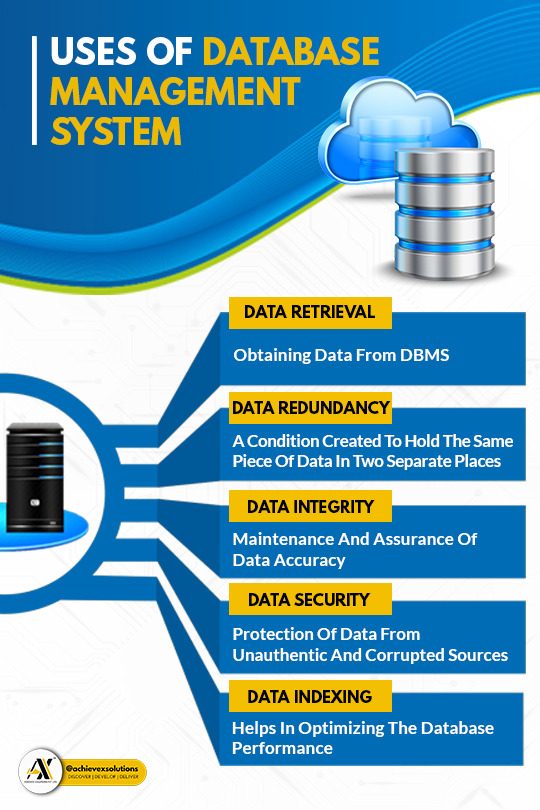
All we need is something that can keep all our information secured, protected, and updated. This is where we need the full potential of Database Management Systems.
DBMS, as we know is the method to keep the data in a computerized way, which provides several other facilities to perform several other operations. Functions like Data Retrieval, Data Security, etc. are some of the most crucial methods to keep us untouched.
Hence, here are some of the uses of Database Management Systems that we should consider.
#databasemanagementsystem#datasecurity#website#it services#it consultancy services london#contentmarketing#marketingstrategy#itcompany#AchieveWithAchieveX
0 notes
Text
Benefits and Drawbacks of using a database management system-ZorroApps
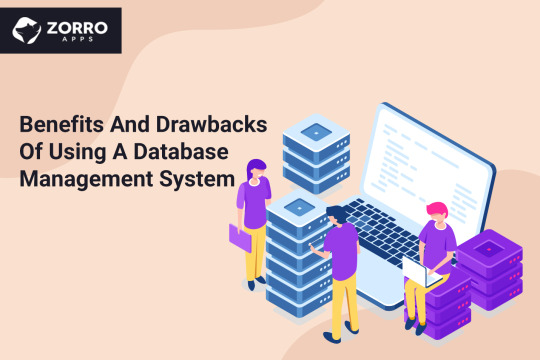
A database management system (DBMS) is a set of programs that manages the database structure and controls access to the data contained inside. It serves as the medium between the user and the database. Commercial database management systems include Oracle, SQL servers, FoxPro, base, and IMS. Let's understand the advantages and disadvantages of a database management system visit: https://zorroapps.com/benefits-and-drawbacks-of-using-a-database-management-system
0 notes
Link
0 notes